Warning: Undefined array key "ssba_bar_buttons" in /home/robinder/public_html/wp-content/plugins/simple-share-buttons-adder/php/class-buttons.php on line 598
Warning: Undefined array key "ssba_bar_buttons" in /home/robinder/public_html/wp-content/plugins/simple-share-buttons-adder/php/class-buttons.php on line 598
Warning: Undefined array key "ssba_bar_buttons" in /home/robinder/public_html/wp-content/plugins/simple-share-buttons-adder/php/class-buttons.php on line 598
Warning: Undefined array key "ssba_bar_buttons" in /home/robinder/public_html/wp-content/plugins/simple-share-buttons-adder/php/class-buttons.php on line 598
Warning: Undefined array key "ssba_bar_buttons" in /home/robinder/public_html/wp-content/plugins/simple-share-buttons-adder/php/class-buttons.php on line 598
Warning: Undefined array key "ssba_bar_buttons" in /home/robinder/public_html/wp-content/plugins/simple-share-buttons-adder/php/class-buttons.php on line 598
Warning: Undefined array key "ssba_bar_buttons" in /home/robinder/public_html/wp-content/plugins/simple-share-buttons-adder/php/class-buttons.php on line 598
This is a guest post by the following writers, all of whom are undergraduate students enrolled in “Introduction to Interdisciplinary Studies” at Plymouth State University. The university is currently restructuring itself around interdisciplinary clusters, so I asked these students to weigh in, and offer their most informed ideas, questions, and critiques as the university embarks on this new path. UPDATE on 4/27/2016: please note that this post is heavily edited by me for clarity, continuity, and focus. To engage with individual students directly, you can contact them via Twitter and they can connect you to their ePorts so you can read their own writings, or you can comment below and students will check back in as the semester winds down. Adding unmediated voices to the conversations is important, and this post is certainly mediated by me as both an editor and as the professor of the class.
Contributing writers:
Gillian McCreedy, Erin Murphy, Abby Taper, Janet Currier, Morgan Maxner, Megan Suda, Darian Rideout, Stelios Eleftheriou, Brandon Rich, Shelby Chapman, Kate Burgess, Colby Downes, Stacy Navis, Trevor Garvin, Andreana Sideris, Christine McElreavy, Mariah Davis, Paige Constantineau, and Maya Infascelli
What can Plymouth State University learn from its Interdisciplinary Studies students as it embarks on this transformation? What is important to you about interdisciplinary approaches to education? What is important to the average undergraduate? What is important to the public that PSU serves?
Students want the ability to control our own education rather than feel like we’re being shuffled through a system. We have a lot of debt when we graduate from college, so we need our education to help us start a career; sometimes it works better for us to focus on what we are passionate about and what we might like to do after graduation and design an education based on those interests rather than starting with the educational plan and then just looking for a job once we complete it. This is different than job training, though. This is about knowledgeable and innovative people working collaboratively on real-world projects and issues, which will help us develop flexibility and adapt to change more easily. This is what the new landscape of career looks like, and we can be prepared for it by connecting our schoolwork to the world outside of college. Then, as our careers change and develop over the years, we are ready to change with them. For this reason, we still believe that General Education is key, since it allows us to have broader skills and knowledge that can help us as our fields evolve in new directions over the years.
We want to stress the idea of applied learning again, since a great idea that seems to go along with the concept of clusters is the opportunity to further internship and experiential knowledge in organizations and businesses outside of PSU. We really hope PSU takes this seriously, and helps us more easily connect with opportunities that extend past our classroom walls as we study.
One concern that we have in looking at the plan as it is now, is that the clusters seem potentially limiting. President Birx wants to bring the departments together and solve real world problems while in an academic setting. These clusters are bringing disciplines together, just like Interdisciplinary Studies. But we are worried that we are just defining these clusters based on disciplines, and that by limiting ourselves to the seven of them, we are possibly just creating a larger version of the tunnel vision that people like Moti Nassani talk about in his writing about interdisciplinarity. We think clusters should be more open, a “come and go” style, where anyone can, at any time, request several disciplines to create a cluster that will solve a specific problem. Disciplines are key to interdisciplinarity, so we want the clusters to value the expertise from departments while enabling people to work together in new and changing ways across those silos. The “fruit salad” metaphor is a good one for clusters. We can retain disciplinary expertise, while combining things together in a new way.
Finally, we want people to remember that communication and empathy are key values in interdisciplinary work, so they should be valued as a core part of the process and goals for our new clusters.
What are some of the most helpful basic ideas that you learned in your introductory Interdisciplinary Studies work (for example, from Allan Repko) that you think all PSU faculty, staff, and students should know as we head down this path?
- Know the values at the core of interdisciplinary work: perspective taking, critical thinking, empathy, ethical consciousness, humility, appreciation of diversity and ambiguity, civic engagement, entrepreneurship, love of learning, abstract thinking;
- Know the history of interdisciplinarity and the disciplines in higher education;
- Know the definition of “interdisciplinary,” and think about purpose, process, and product in that definition.
- Know why the disciplines matter to interdisciplinary projects and fields.
What kinds of experiences could students have in clusters? What ideas do you have for curriculum or for any part of the educational journey? What would you want to DO in a cluster?
Students could embark on multi-field projects within a cluster and get experience working in a variety of fields, not just the one main one they are majoring in. We hope that projects won’t just involve students; we hope that students will be able to have input in the design of projects as well, which is central to our investment in them and also to our ability to identify our own interests and society’s needs. First-Year Seminar would be a perfect place to introduce clusters, but it would be great if professors could team-teach these courses, and rotate in and out of different courses so they could model interdisciplinary work and collaboration as it is introduced. First-Year Seminar should in some ways explain the challenges and barriers that universities set up to doing interdisciplinary work so students can come up with ways around them.
We would love to see creative courses emerge, but not just courses in clusters, but courses betweeen clusters. It is important that clusters really show a new way to work, between and across silos, so that as culture changes, we can do current work in new fields as they emerge. We hope cluster-related courses will really be exciting.
We would want freedom. We understand that there’s a structure for a liberal arts or any undergraduate education, but students should be able to have a way to form their cluster or major in a way that allows them to deeply focus on what they want to do, rather than have to take a series of courses assigned by a major. Obviously, this includes a great deal of advising, but IDS students feel happy and powerful knowing that they have hand selected their own degree. How can this cluster initiative allow all PSU students to benefit from the kinds of self-directed learning that we do in IDS?
What structures should we change, dump, develop here at PSU to help us work in these new ways? What infrastructure do we need/not need?
We think Gen Ed is important, but we wish it connected more with where we want to go in our lives after college. We think alternative Gen Ed should be a thing! Projects, independent study: let’s try new ideas to let us cover general topics in ways that are more customized to our interests and ideas. In addition, we need Gen Eds that are truly interdisciplinary, not just skills-based. This will help students understand the value of interdisciplinary education, so that cluster work will be appreciated.
We also think the residential halls should not be left out of the cluster conversations. Can we organize them around clusters or academics so that we can engage our residential life with our academic work.
What excites you about working in a cluster?
We imagine students working to help or create on actual projects. A project idea might involve a practical application of skills, rather than solely an accumulation of knowledge and theory. For example, instead of taking a class on social work, students will be out in the field, working alongside professors with NGO’s or social services, observing their learning, applying book theory, and gaining hands on experience. Along the way, there should be “checkpoints,” which could involve biweekly reflection papers, evaluations, powerpoints, etc. Research would support the work– we call it a “need to know” approach, where you research something because you REALLY need to know it. Afterwards, they should have to conceptualize their work, reflect on their learning, and present the importance and the significance of their work. That way, students are gaining experience and knowledge rather than just credit and test scores. It’s also lucrative to employers to see that students are engaged in their field at an early age as an undergrad. Credits should be dependent on how much work students do, not just whether or not we sat through a course in a classroom. In-field reviews by mentors can validate the work that students have done, so maybe not all evaluation has to come from a professor.
We think there are IDS characteristics that would improve every program, every major, or every cluster on campus: do they have integrated courses? do they use team teaching (different views, especially applicable to integrated courses)? are there applied learning experiences that get students involved in the field outside of the classroom? are there capstone experiences like ours that help students understand the work they have done in light of the next steps they will take in life? are there thesis or other opportunities for students to contribute to the body of scholarship in their field? are there service-learning opportunities or volunteer hours needed that are related to the field? are there non-disposable projects so students can collaborate and contribute?
What else should IDS students say to PSU as we get this started?
- Ignore any disciplinary bias, go into this with an open mind and be open to new ideas. Don’t be afraid to offer your ideas about how different fields can connect and advance.
- Students should be encouraged to work across clusters, not just inside them. All students should work in interdisciplinary ways as at least a part of their college education.
- Integration is key, but we cannot lose the core disciplines because without them, we don’t have interdisciplinary studies.
- Don’t confuse interdisciplinarity with transdisciplinarity, and try to understand the way that academic disciplines can connect with and also limit nonacademic stakeholders.
- We really want to stress that we need to see more collaborative teaching. Don’t let money stand in the way of that. We think it would really change the way the university works, for the better.
- Look to what other schools are doing. Answer questions by looking at other schools and seeing how they solved their problems.
- Interdisciplinary Studies majors already exist here. You should build on our work, let us teach you about the theory that we have learned, and look at our programs to see how we can lay a foundation for this new initiative.


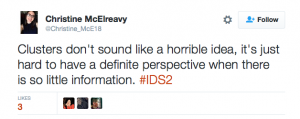
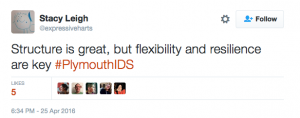
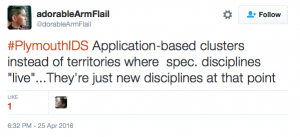
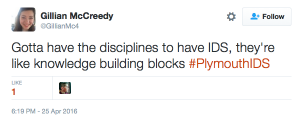
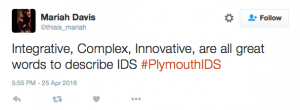







This post brings up a lot of interesting points! I am an IS 4444 student and enjoyed a lot of your different insights on the matter of clusters. I think something that I really resonated with was the idea of gen eds being more relevant. For some students they just take what they can fit and it doesn’t motivate or interest them. I also think the idea of creative classes between clusters is exciting as well. Mixing and connecting across departments is great and can create a lot of new ideas and projects!
My name is Sarah, I’m a student in IS4444. My major is titled Applied Creative Expressions a combination of marketing, communications, photography, and writing. I believe this idea of clusters is fantastic and is exactly what a student in college needs. Although many students don’t know what Interdisciplinary Studies is, or even what interdisciplinarity MEANS, I believe students could really benefit from many of these ideas listed. I think it is important to take into account the idea of revamping Gen-Ed courses, taking an individual students interests and covering topics/doing projects that truly benefit their academic interests. Additionally, I believe it is crucial to have experiences outside of college and these clusters could make this concept come to life more than just internships that a specific major requires. This also creates experiences that students can benefit from after college. From my experience interviewing for positions, companies LOVE first of all that I’m an Interdis. Major…it makes me seem versatile and unique. On top of that being able to put these projects on resumes makes us IS students become even more valuable to employers.
I am a Senior Math and Business Interdisciplinary Studies majors. One of the key things that I agree with most is how Robin sees it, that with the clusters still being closed off (in the seven groups) then the majors will not all be able to blend together and there will still be a lot of gaps, if there are seven groups then some groups would be together. The school would get a bit more cohesive but not too much. Being Math and Business I did not have any similar people in any of my classes. I had business classes with all Business majors and math classes with Math, Meteorology, and Computer Science majors. Both groups never grew further than that and I felt like an outcast in the Business classes because all of them had the same schedules and teachers. Plymouth needs to be open and mix up the clusters every semester or two so that people get to work together with majors they did not except. If Plymouth wants to be truly interdisciplinary then they will need to broaden to all majors combining in different ways at some point.
As a current senior amongst the interdisciplinary program I am happy to admit that we are simply the unicorns of the university. We obtain the ability to derive knowledge from a wide-range of disciplines while inheriting alternative perspectives. Truthfully, I think the transformational program of clusterizing interdisciplinary studies will allow IDS students to not only gain knowledge just from ones chosen disciplines, but from other IDS students and their different perspectives. I believe that these clusters at PSU will expand the organization of the Interdisciplinary program, and lead to the start of renovation of higher education. It would also be nice if the interdisciplinary studies program had an office to regularly meet, and go over pre-planned academic curriculums.
The interdisciplinary program here at Plymouth State is great and I think that the university shifting towards clusters is a cool idea. It is a chance to learn new things from different areas that can really help students future careers. I especially like the idea that was stated in this post about introducing clusters in first year seminar. I think it would set the tone of all the ideas of clusters nicely and gives first year students involved right away. I also like how it was stated about IDS characteristics improving every program, every major, and/or every cluster on campus. I think that would show any faults/flaws in either program, major, and/or cluster that can be improved to help students succeed in their future career.
Personally, I transferred to PSU knowing what I wanted to major in, however, this would have set me back and allowed me to be in school for longer than I thought. At the time Interdisciplinary Studies was coming out of the wood works. My advisor knew of the major, but this process was a very difficult thing for me to overcome. These clusters are going to be a great idea for upcoming students and current students because they will not be forced to focus on one subject at a time for 4 years. Having a number to how many subjects that can be in a cluster should not be a rule because there are so many subjects that relate to one another directly and indirectly. Many people don’t realize that interdisciplinary studies plays a great role in your future. For example, if you are hired for a job that focusses on one thing, but you are knowledgeable enough in another subject to contribute more to the company, this could be very beneficial for you.
The clusters will assist students and faculty in understanding the importance how all these subjects relate to one another. These clusters, if organized properly, will benefit many students and make students not feel they have to be in school for more years than expected. They can have a choice on what they want their degree to be and how they want to create the degree!
I find it very important to stress the fact that students want to be able to have a voice within their education. We do not want to come to College and have the path completely laid out for us. We want to be able to make some decisions regarding classes that we want to take and how they are going to relate to our future careers. After studying in the Interdisciplinary Program, I can say that I have a much better understanding of what it takes to collaborate with individuals from other fields and how we can establish common ground. After studying in an interdisciplinary learning style I have also realized it is extremely important to not focus on in only some disciplines while in an interdisciplinary setting. By this I mean that we should not overemphasize some disciplines such as business when teaching. Many times, even when in an interdisciplinary setting I have seen some disciplines getting more attention and focus. Sometimes disciplines, such as business are seen as more valid and taken more seriously when compared to fields such as dance. It’s important to make sure that all disciplines are getting equal attention and respect from all faculty members. Many times, I have spoken to faculty members who have felt that their discipline is more important than another. For these clusters to work, we need to change the whole culture of the University to ensure that faculty are transitioning to this new mindset of teaching students as interdisciplinarians.
I really agree with the statement about having the clusters more of a “come and go” because the way they have currently set up the clusters are too narrow focused rather than an endless supply of perspectives. I think what the president is trying to do with the clusters is a great idea especially because the world is starting to move this way and we need to graduate into this world with a large perspective. Having 7 clusters is too small and confined. I really like the statement about how us students want freedom because we are so centered around one discipline. From experience being forced into one discipline is disappointing and a struggle and once I joined Interdisciplinary Studies my perspective grew incredibly which is not making me more valuable for jobs I am currently applying for. Overall this step our university is going is not only going to help the university but also those who will be getting a degree from Plymouth State University.
My name is Marina Phillips and I’ll be graduating with an Interdisciplinary Studies degree through Plymouth State University this May. I feel that an interdisciplinary way of thinking is extremely important to all, not just those who are apart of the Interdisciplinary Studies major. With the creation of these clusters coming up I feel that the university should use their abilities to have the entire student body adopt an interdisciplinary way of thinking, not just those whom have chosen to take part in creating their own unique major. For example different departments or “clusters” should involve one another in a interdisciplinary project. An example off the top of my head will look something like this; the social work department and nursing department can come up with a program together in how to deal with families in the hospital setting. I think this can create something extremely special!
I really love the idea of the courses emerging BETWEEN the clusters rather just WITHIN the clusters. This would permit for establishment of common ground and the opportunity for perspective taking. In order to benefit the education of the undergraduate students, I think there should be an annual project for each student (regardless of their major) that permits for integration of a different discipline that can be incorporated within their major. With this, all perspectives can be taken into consideration without biases, which is a huge problem within the real world. Since education prepares us for the life of work after schooling, this would be important so that people have more experience under their belt working with these fields because this is a huge advantage for students and a huge disadvantage for those who lacked the insight of integrating different. Diversity is always better!
Someone requested that I post the tentative names of the clusters as they stand now. Here they are:
Strategic Clusters
Arts + Technology
Education, Democracy + Social Change
Exploration + Discovery
Health + Human Enrichment
Innovation + Entrepreneurship
Justice + Security
Tourism, Environment + Sustainable Development
Reflection. That was the term that stuck out to me when reading these responses from fellow PSU students about the new cluster approach. Throughout my 3 three years in college, I have come to realize that I learn best when information is reinforced and analyzed again and again. More often than not, I have found myself signing up for a course, sitting through the lecture for an entire semester, and losing the information presented after I finish the final exam. It has been my experience with courses that incorporate reflection through discussion, projects, or papers, I am more likely to cement my findings and take my knowledge further than the four walls of my classroom. With these clusters I think that reflection strategies such as projects in first-year seminar courses and capstones senior year, will really solidify students’ learnings.
I am very interested in this cluster approach that PSU is starting to create. I think it holds great potential for incoming students to explore their interests and truly love what they’re learning!